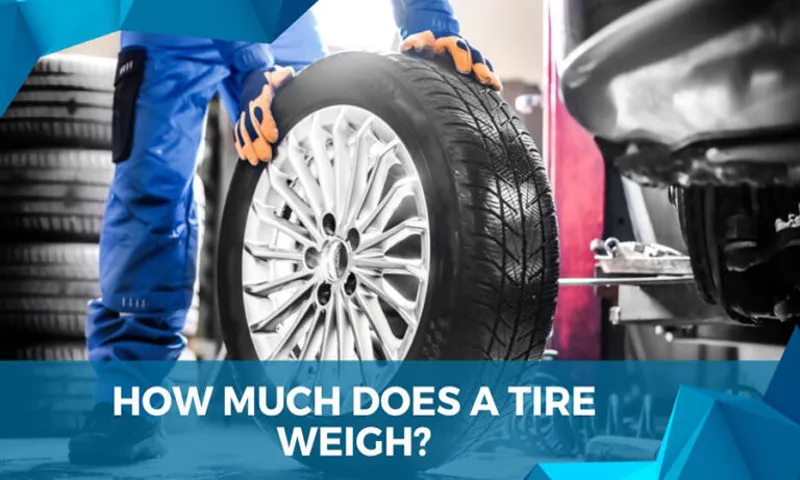Have you ever wondered how much your tires actually weigh? It’s not exactly something we think about on a daily basis, but the answer may surprise you. The weight of a tire can vary greatly depending on the size, type, and brand. On average, a passenger car tire can weigh anywhere from 20 to 30 pounds.
However, larger tires for SUVs and trucks can weigh upwards of 60 to 70 pounds or more. Imagine carrying around a stack of tires that weigh as much as a small child! But why does the weight of a tire matter? Well, it can affect everything from fuel efficiency to overall vehicle performance. Heavier tires can cause drag on the road, leading to increased fuel consumption.
On the other hand, lighter tires can improve acceleration and handling. So the next time you’re in the market for new tires, take a moment to consider their weight. It may not be the most exciting aspect to think about, but it can make all the difference in your driving experience.
Table of Contents
Understanding Tire Weight
If you’re wondering how much a tire weighs on average, the answer isn’t as straightforward as you might think. The weight of a tire can vary depending on the size, material, and intended use. For example, the weight of a standard passenger tire can range from 20 to 30 pounds, while a heavy-duty truck tire can weigh upwards of 100 pounds.
When it comes to material, tires made from natural rubber tend to be heavier than those made from synthetic rubber. Additionally, tires designed for racing or high-performance driving may be made with lighter materials to reduce weight and improve speed and maneuverability. Ultimately, the weight of your tire will depend on a variety of factors, so it’s important to consult with a professional when selecting the right tire for your vehicle.
Factors that Affect Tire Weight
Tire weight plays a crucial role in the performance of a vehicle, and there are numerous factors that affect it. One of the key factors that affects tire weight is the size of the tire. Larger tires tend to be heavier compared to smaller ones due to the amount of material required to construct them.
The type of tire also plays a significant role, with different types of tires having varying weight. For instance, performance-oriented tires tend to be heavier compared to standard touring tires due to their advanced technology and construction materials. The type of vehicle and its intended use also have a bearing on tire weight, with heavy-duty trucks requiring heavier-duty tires compared to standard passenger vehicles.
Additionally, the materials used in the construction of the tire also determine its weight. Those made from advanced materials such as carbon fiber and kevlar are typically lighter than traditional tires. Overall, it’s important to choose the right tire weight for your vehicle, taking into account its size, type, and intended use to ensure optimal performance.

Construction Type of Tires
When it comes to understanding tire weight, it’s important to consider the type of construction used in the tire. Generally, there are two types of tire construction: bias-ply and radial. Bias-ply tires are typically heavier than radial tires due to their construction, which features overlapping layers of fabric cords that run at a diagonal angle to the tire’s centerline.
On the other hand, radial tires use a different construction method that involves layers of cords running perpendicular to the tire’s centerline. This results in a lighter tire that provides better fuel efficiency and handling. However, it’s important to note that tire weight can vary depending on factors such as size, load capacity, and tread design.
Overall, understanding the construction type of tires and how it impacts weight can help you choose the best tires for your vehicle and driving needs.
Tire Size and Load Capacity
When it comes to understanding tire weight, it’s important to consider both tire size and load capacity. The size of a tire can directly impact its load capacity, which is the maximum amount of weight a tire can safely carry without risking blowouts or other safety issues. It’s crucial to match the tire size and load capacity with the weight of the vehicle, as well as any additional payloads it may carry.
Understanding the weight limits of a tire can help ensure not only the safety of the driver and passengers, but also the longevity and performance of the tire itself. So, when purchasing new tires, take into account the weight of your vehicle, the size of the tires you need, and any loads you may be carrying to ensure optimal safety and performance on the road.
Average Tire Weights by Type
If you’re wondering how much does the average tire weigh, it really depends on the type of tire. For instance, a standard passenger car tire can weigh anywhere from 20 to 30 pounds, while a larger SUV or truck tire can weigh up to 50 or 60 pounds. Meanwhile, performance tires, designed for sports cars or racing vehicles, can weigh between 15 to 20 pounds, thanks to their lighter materials and construction.
Finally, motorcycle tires can weigh anywhere from 3 to 20 pounds, depending on the make and model of the bike. It’s important to remember that these are just average weights, and actual tire weights can vary based on a wide range of factors, including tire size, manufacturer, and composition. So, the next time you’re looking to buy new tires, make sure to do your research and find the right set that meets your specific needs.
Passenger Car Tires
Passenger Car Tires Passenger car tires come in various categories based on their type, size, and purpose. Each tire type possesses a unique design and construction, which affects its weight. Average tire weights by type indicate the typical weight of a tire, which is crucial information for car owners when purchasing tires.
For instance, run-flat tires, mostly used in luxury cars and sports cars, tend to be heavier than regular tires due to their reinforced sidewalls. Furthermore, all-season tires, popular for their durability and versatility, have an average weight of around 27 pounds, with some models weighing a bit more. In contrast, performance tires aim to deliver higher responsiveness, handling, and grip, and thus, their weights are relatively lighter, ranging between 20-24 pounds.
The tire’s weight is crucial, as it affects the car’s overall weight and performance, especially acceleration, fuel efficiency, and handling. Thus, car owners should consider the average tire weights by type while shopping for new tires so as not to compromise their vehicle’s performance.
Light Truck Tires
Light truck tires are an essential component of any truck, providing stability and safety on the road. When looking to replace your light truck tires, it’s important to consider the weight of the tire. The average weight of a light truck tire varies depending on the type of tire.
All-terrain tires, for example, are heavier than highway tires due to their thicker tread and deeper grooves. The average weight of an all-terrain tire is around 50 pounds, while a highway tire can weigh around 35 pounds. The weight of the tire can also affect fuel efficiency; heavier tires can decrease gas mileage.
It’s important to choose the right tire for your needs, weighing the benefits of stability and safety against the potential cost of fuel inefficiency. By considering the weight of the tire when making a purchase, you can find the perfect tire to keep you and your truck safe on the road.
Heavy Truck Tires
Heavy truck tires are crucial for transportation and logistics companies, and choosing the right weight is essential for safety, fuel efficiency, and wear and tear. Heavy truck tires come in different types and sizes, each with its average weight. The most common types of heavy truck tires are steer tires, drive tires, and trailer tires.
Steer tires are typically the lightest and weigh around 75 pounds, while drive tires can weigh up to 100 pounds. Trailer tires are the heaviest, with an average weight of 100 to 110 pounds. Choosing the right weight for your truck tires can improve fuel efficiency, reduce tire wear, and even help you stay compliant with vehicle weight regulations.
If you’re not sure which type and weight are best for your truck, consult with an expert who can help you make the right choice. Trust me, it can save you a lot of trouble down the road.
Conclusion
In conclusion, the weight of an average tire can vary depending on the make and model. However, one thing is for sure – it’s no featherweight! So, if you’re planning on lifting and carrying a tire, be prepared to use some muscle. Or, you can always call in some reinforcements and make a tire-lifting party out of it.
Either way, remember that nothing is impossible when you have a good grip and a can-do attitude!”
FAQs
What is the average weight of a car tire?
The average weight of a car tire is around 22 pounds (10 kg).
How much does a typical truck tire weigh?
A typical truck tire can weigh anywhere between 60 to 100 pounds (27 to 45 kg) depending on the size and type of the tire.
What is the weight of a motorcycle tire?
The weight of a motorcycle tire varies depending on the model and size, but it typically ranges from 3 to 10 pounds (1 to 4.5 kg).
How do I weigh my tires at home?
You can weigh your tires at home by using a bathroom scale or a luggage scale. Simply remove the tire from your vehicle, place it on the scale, and note the weight.
Why is the weight of a tire important?
The weight of a tire affects its overall performance, including handling, fuel efficiency, and lifespan. Lighter tires may offer better fuel economy, while heavier tires may provide better stability and durability.
How much does a spare tire typically weigh?
A spare tire can weigh anywhere between 20 to 45 pounds (9 to 20 kg) depending on the size and type of the tire.
What is the weight limit for tires on a vehicle?
The weight limit for tires is usually specified by the vehicle manufacturer and can be found in the owner’s manual or on a label inside the driver’s door. It is important to ensure that the tires on your vehicle can safely support the weight of your vehicle and its occupants.



